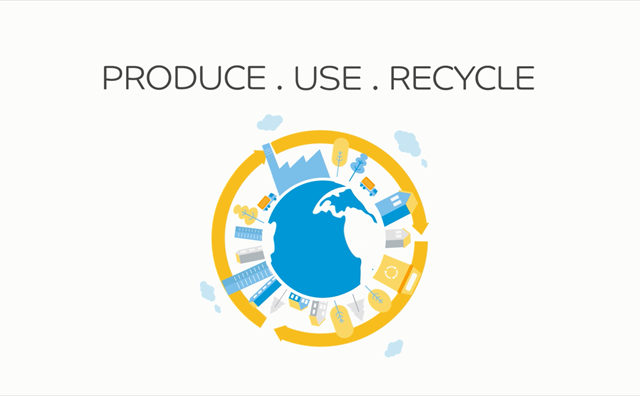LIFE CYCLE ASSESSMENT OF CERTIFIED CIRCULAR POLYMERS
SABIC’s TRUCIRCLE™ portfolio and services plays a significant role in achieving our vision of closing the loop on used plastic. A key solution within our portfolio are our certified circular polymers, made using feedstock produced through advanced recycling of previously difficult to recycle used plastic. The process converts this plastic into pyrolysis oil, which is then used to create polymers with identical properties to virgin plastics, contributing towards a circular economy for plastic
Life cycle assessment (LCA) enables scientific comparison of different recycling options to substantiate their sustainability credentials. We have undertaken a full LCA to investigate the environmental performance of SABIC certified circular polymers, by comparing the environmental impacts linked to substitution of fossil feedstock with feedstock produced through the advanced recycling of used plastic.
Our study, which has undergone ISO Critical review by external LCA and domain experts, found that advanced recycling offers a reduced overall carbon footprint, with the potential to save approximately 2 kg of CO2 emissions for every kilogram of certified circular polymers.
Goal and scope considerations – direct and indirect impacts
We have looked at two ways to measure the impact of our certified circular products. Firstly, there is the direct impact of the carbon footprint produced through advanced recycling, versus that produced using traditional fossil feedstock.
When examining the direct impact of advanced recycling, our study indicates that this route has a higher carbon footprint of between 6-8% compared to the more traditional fossil feedstock route for producing polymers. The two can therefore be considered to have a comparable direct carbon footprint, allowing for a margin of error. However, it is important to note that there is potential to improve the energetics of pyrolysis technology for advanced recycling, which could make the carbon footprint of this route more favorable.
Secondly, there is also the indirect impact of the advanced recycling route. By avoiding the diversion of used mixed plastics towards incineration for heat and power generation, around 2kg of CO2 can be saved per kg of polymers produced through advanced recycling.
Our study also concluded that the to the advanced recycling process linked to production of certified circular polymers leads to reduction of fossil depletion potential of around 80-84%.
Future energy-saving potential
This study has also highlighted promising opportunities for further reduction of the carbon impact of our certified circular polymers. In a scenario where renewable energy is used to compensate for the energy otherwise derived from incineration of waste plastics, this could generate savings of up to 5 kg of CO2 emissions for every kg of circular polymers. We are already working to install renewables at our sites, and our ambition is to have a 4 GW mix of wind and solar energy installed at all sites globally by 2025, rising to 12 GW by 2030.
This study has demonstrated the greater environmental performance of our certified circular products, compared to polymers produced using traditional fossil feedstock. Alongside providing greater transparency for customers around the sustainability of our TRUCIRCLE portfolio and services, it will shape our product and technology development strategy further so that we can continue to increase the circularity and sustainability credentials of our products.
The Mass Balance Approach
The certified products from SABIC’s TRUCIRCLE™ portfolio have been produced through the adoption of a mass balance accounting system.
Mass balance helps to trace the flow of materials along a complex supply chain, from the feedstock to the final product by following predefined and transparent rules. These rules then define whether a product can be classified as renewable or circular.
For SABIC this means that for each ton of renewable or circular feedstock fed into our production process and substituting fossil-based feedstock, approximately a ton of the output materials can be classified as either renewable or circular.
By adopting this approach, the certified products from our TRUCIRCLE portfolio are accredited under the International Sustainability and Carbon Certification Plus (ISCC) scheme.

